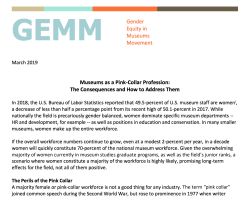Why Followers Matter
Posted: March 26, 2018 Filed under: Communication, Followership, Leading Across Organizations, Museum, museum staff, Nonprofit Leadership, Servant Leader, Workplace Values | Tags: Leadership, museums, soft skills 3 Comments
Not long ago a reader commented that leadership isn’t everything, that there’s a value in being a good follower as well. That remark stuck with me. In the four years since we began this blog we’ve looked at leadership from all directions. We’ve written about being the Lone Ranger director, about leading from the middle, about decision making, and about leadership and self-awareness. But we’ve neglected what it means to be a foot soldier. So today we turn the spotlight on followership.
According to our friends at the Bureau of Labor Statistics there are 353,000 museum and heritage organization employees. We have to assume that the vast majority do not occupy the corner office. They tend to have more responsibility than authority. They are assistant curators, fund raisers, educators, and volunteer coordinators. Some may go through an entire week and not see a member of their organizational leadership team, and yet all the planning, the vision, and the courage leaders incubate comes to life with the followers. They are the yin to the leadership yang.
Our reader was right: There is a stigma associated with followership. If your aspirations lean toward leadership, you don’t want to be tagged as the person who gets behind the concept, works well with others, and helps deliver a superior event, program or exhibit. Leadership in the United States is an individual thing, populated by creative outliers who sometimes believe they can do it on their own. Followership is a different sort of place.
Leaders sometimes have a reputation for arriving fully formed behind the big desk, but unless you’re an entrepreneur/visionary like Jeff Bezos your career trajectory usually begins as part of a team, a program, a department. There you learn to collaborate, to work with others. You support your leader’s decisions and share in the resulting successes. And, in a healthy museum or heritage organization, you feel comfortable challenging leadership, particularly in the face of something unethical. And even if you go on to become a leader, whether by accident or aspiration, without an understanding and an empathy for the qualities of followership, your leadership practice will suffer.
Of course there are also staff members who are undistinguished followers. They are the hermits–isolated individuals who’ve left before they leave. They are the unmotivated, kind of like an 8th grader who won’t participate in the team project except to tell everyone else what is wrong with it. And they are the trouble makers who participate through gossip, leaving discord in their wake.
For skilled followers–the ones coveted by all museums– work trumps individual differences–political, religious or lifestyle beliefs. For these folk, what’s important is what’s shared–delivering, for example, a brilliant historic site program blending geometry, history, and philosophy with grace and humor–not what you don’t. Every organization needs those folks. Accomplished followers are the people who bring good humor to collections storage when a pipe bursts and it’s all hands on deck. They are the folks who say thank you.
So, if you’re a leader, know your team. Even if your team is two volunteers and a part-time curator. Listen to them. Value them. Know what motivates them. Welcome the moments when they challenge ideas because it indicates they’re with you, and they want the best for the museum. Figure out ways to remove the barriers with which they may be struggling. Pay them what they’re worth. Thank them.
Joan Baldwin










Very good post. I sent it to my daughter who is enrolled in some course on leadership at GWU. Good points of how to become a good leader as well as be a good leader – unfortunately missing in many!
Years ago in one of my MBA classes the instructor asked “What makes a leader?” We all shouted out the expected things — “Vision!” “Values!” “Execution!” an on and on until we couldn’t think of anything else. After we were quiet, the instructor said “None of you said followers. Unless people are actually following you, you can call yourself a leader all you want, but it is followers who make you a leader.” I’ve never forgotten that definition of leadership.
[…] MD: Rowman & Littlefield, 2017. What is the Right Fit? A Deeper Analysis of Museum Boards https://leadershipmatters1213.wordpress.com/2018/03/26/why-followers-matter/ […]